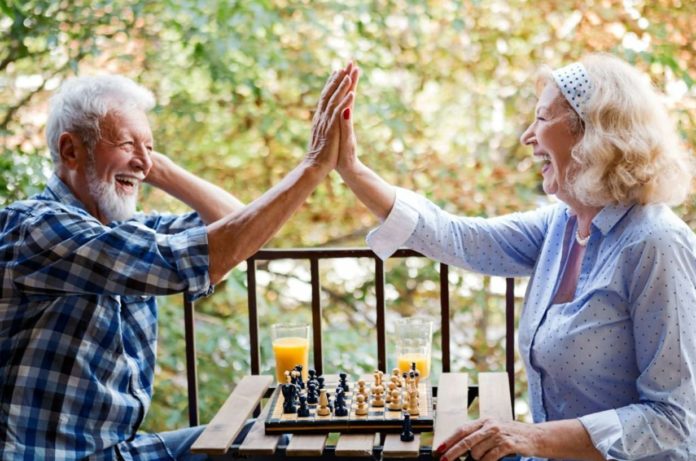Statistical research covering 200 years across all continents and published in the open access journal BMJ Open shows that men have a significant likelihood of outliving women—especially those who are married and have a degree.
According to the researchers, between 25 and 50 percent of men have outlived women, casting doubt on the common thinking that men simply don’t live as long as women. They also note that sometimes significant differences in life expectancy can cover up significant overlap in lifespan between the genders.
Over time, many different populations have seen that females tend to live longer than males. However, rather than comparing years lived, life expectancy is frequently used to compare sex differences in survival, and this has been read as “men do not live as long as women,” the researchers say.
They were interested in determining the likelihood that males outlive females through time and across populations, and they wanted to examine the effects of changes in life expectancy and differences in lifespan between the sexes.
In 199 populations from every continent over a 200-year period, they looked at sex differences in fatalities using a specific statistical method called the “outsurvival” statistic.
If you’re from a group with a high death rate, this statistic estimates how likely it is that you will outlast someone from a lower death rate.
Using data from the Human Mortality Database, researchers analyzed life tables by sex and year for 41 nations and the four countries of the United Kingdom.
They used shortened versions of the World Population Prospects 2019 life tables. It offers sex-specific life tables for 199 nations, broken down into age groups of 5 years and 5-year time frames from 1950–54 to 2015–19.
Finally, they used national US statistics on deaths and population counts to assess the likelihood of men outliving women by educational attainment and married status.
The analysis of the data showed that since 1850, the chance of a man living longer than a woman has been between 25% and 50% at all times and in all populations, with only a few values above 50% in different countries at different times.
These included Iceland in 1891, Jordan in 1950–54, Iran in 1950–64, and Iraq in 1960–69. They also included Bangladesh, India, and the Maldives before 1985, as well as Bhutan between 1995 and 2010.
In other words, the results contradict the conventional knowledge that males simply don’t live as long as women, showing that between 1 and 2 (25 percent – 50 percent) out of every 4 men have outlived women throughout the past 200 years.
Up until the 1970s, in developed nations, the likelihood of males outliving females decreased; thereafter, it gradually rose in all groups. Smoking and other behavioral factors were mostly to blame for the increase and fall in sex differences in life expectancy.
According to the researchers, although men are more likely to live longer than women do in low- and middle-income nations, this does not necessarily translate into more survival equality between the sexes.
In the 1950s and 1960s, values for men in South Asian countries were higher than 50 percent. In India, the death rate for children under 5 has always been higher for girls than for boys. This hasn’t changed in recent years.
However, during the 1980s, fewer girls than boys over the age of 15 passed away, ‘balancing out’ the deficit at earlier ages, according to them.
Additionally, a few outside elements appear to be crucial. For instance, throughout the whole US population from 2015 to 2019, there was a 40 percent chance that men will outlive women.
However, this number differed depending on marital status and level of education: the likelihood of men outliving women was 39 percent for married people and 37 percent for single people. Additionally, those with a university degree saw a decrease to 43 percent, while those with only a high school diploma saw an increase to 39 percent.
Additionally, married men with degrees have an advantage over single women with merely a high school education. The researchers note that couples have an impact on one another’s health, and this is especially true for males who get more from being in a committed relationship than women do.
In their article, they state that “a blind interpretation of life expectancy differences can sometimes lead to a distorted perception of the actual inequalities [in lifespan].”
“Not all females outlive males, even if a majority do. But the minority that do not is not small. For example, a sex difference in life expectancy at birth of 10 years can be associated with a probability of males outliving females as high as 40%, indicating that 40% of males have a longer lifespan than that of a randomly paired female,” they write.
By comparing only life expectancy, it is assumed that all males have a 10-year disadvantage. However, only a small percentage of males will have short lifespans, which will account for the disparity. For instance, in most nations, baby boys die more frequently than baby girls.
Nevertheless, the data demonstrate that, particularly in the first half of the 20th century, the death rate has decreased more quickly for women than for men under 50, generally due to decreases in baby and child fatalities.
Men’s survival disadvantage has persisted not only as they get older, but also as they get younger. In their 20s and 30s, they are more prone to accidents and homicides. They also smoke and drink more, which increases the risk of cancer and mortality in their 60s.
The researchers contend that sex disparities in survival require a more comprehensive approach. “Efforts in reducing lifespan inequalities must thus target diverse factors, causes and ages,” they conclude.
Image Credit: Getty
You were reading: These Men Have High Probability Of Outliving Women
